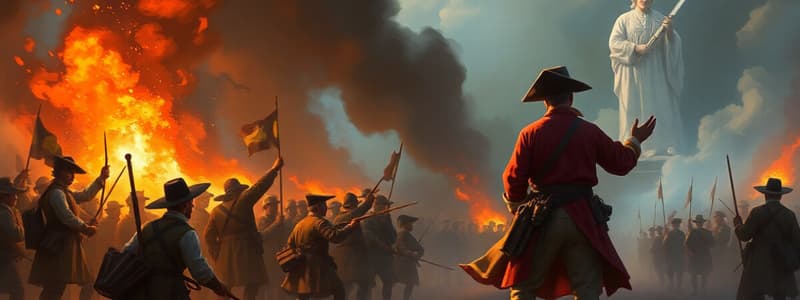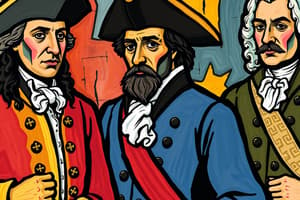Podcast
Questions and Answers
What was the main reason the American colonists were upset over new taxes?
What was the main reason the American colonists were upset over new taxes?
- They had no representation in Parliament (correct)
- They opposed all forms of taxation
- They wanted to trade freely without restrictions
- They were already financially stable
What was a significant consequence of the Boston Tea Party?
What was a significant consequence of the Boston Tea Party?
- It resulted in stricter British regulations (correct)
- It encouraged all colonies to unify against Britain
- It led to the immediate independence of the colonies
- It decreased tensions between colonists and Britain
Who was primarily responsible for writing the Declaration of Independence?
Who was primarily responsible for writing the Declaration of Independence?
- John Locke
- James Madison
- Thomas Jefferson (correct)
- George Washington
Which idea significantly influenced the structure of the U.S. Constitution?
Which idea significantly influenced the structure of the U.S. Constitution?
What was the primary role of the Continental Army during the American Revolution?
What was the primary role of the Continental Army during the American Revolution?
Which event is commonly viewed as a spark for revolutionary sentiment in the colonies?
Which event is commonly viewed as a spark for revolutionary sentiment in the colonies?
How did the Enlightenment influence the American Revolution and subsequent forms of government in Europe?
How did the Enlightenment influence the American Revolution and subsequent forms of government in Europe?
What was a primary goal of the 1st Continental Congress?
What was a primary goal of the 1st Continental Congress?
Flashcards
Stamp Act
Stamp Act
A 1765 tax law that required colonists to pay a tax on all printed materials, including legal documents, newspapers, and playing cards.
No taxation without representation
No taxation without representation
Colonists protested against British taxation without representation. They argued that they should not be taxed without having elected representatives in the British Parliament.
Boston Massacre
Boston Massacre
A confrontation in 1770 where British soldiers fired on a group of colonists, killing five. This event heightened tensions between the colonists and the British.
Boston Tea Party
Boston Tea Party
Signup and view all the flashcards
Declaration of Independence
Declaration of Independence
Signup and view all the flashcards
Philosophes
Philosophes
Signup and view all the flashcards
Impact of the American Revolution
Impact of the American Revolution
Signup and view all the flashcards
Enlightenment Principles
Enlightenment Principles
Signup and view all the flashcards
Study Notes
American Revolution Key Terms
- George III: Claimed royal power, aided trade between colonists and Europe, increased population.
- Seven Years' War (French and Indian War): Drained British treasury.
- Stamp Act: Colonists had to pay tax for official stamps on documents and printed materials.
- Boston Massacre: British soldiers shot colonists in confrontation.
- Boston Tea Party: Patriots threw tea into Boston Harbor.
- First Continental Congress: Group protesting treatment of Boston.
- Second Continental Congress (1775): Voted to raise an army.
- Continental Army: Led by George Washington.
- Declaration of Independence (1776): Issued by Second Continental Congress, written by Thomas Jefferson.
- Constitution (1787): Constructed based on Locke's and philosophe ideas.
Main Concepts
- Colonial Discontent: Colonists opposed new taxes without representation in Parliament.
- Inspiration for Declaration: Thomas Jefferson drew inspiration from John Locke's ideas (life, liberty, property).
- Philosophical Influence: Enlightenment principles (Montesquieu's separation of powers) influenced the US Constitution.
- Impact on Europe: Successful revolution inspired other colonies, especially in France, to revolt. The revolution proved Enlightenment principles could succeed.
Colonial Conflict
- Boston Massacre (1770): British soldiers shot and killed colonists.
- Boston Tea Party (1773): Colonists protested unfair taxation by throwing tea into Boston Harbor.
- Continental Congress (1774): Group that decided on action against Britain.
- Second Continental Congress (1775): Formed to decide the course of action for the colonies.
- Lexington and Concord (1775): Battles that started the American Revolution.
Independence
- Second Continental Congress (1775): Created a continental army.
- American Revolution Start: Britain refused colonists political rights.
- Declaration of Independence (1776): Based on John Locke's ideas (life, liberty, property, "natural rights").
- American Victory: The Continental Army (aided by France), through strategic warfare, ended British rule.
Studying That Suits You
Use AI to generate personalized quizzes and flashcards to suit your learning preferences.




